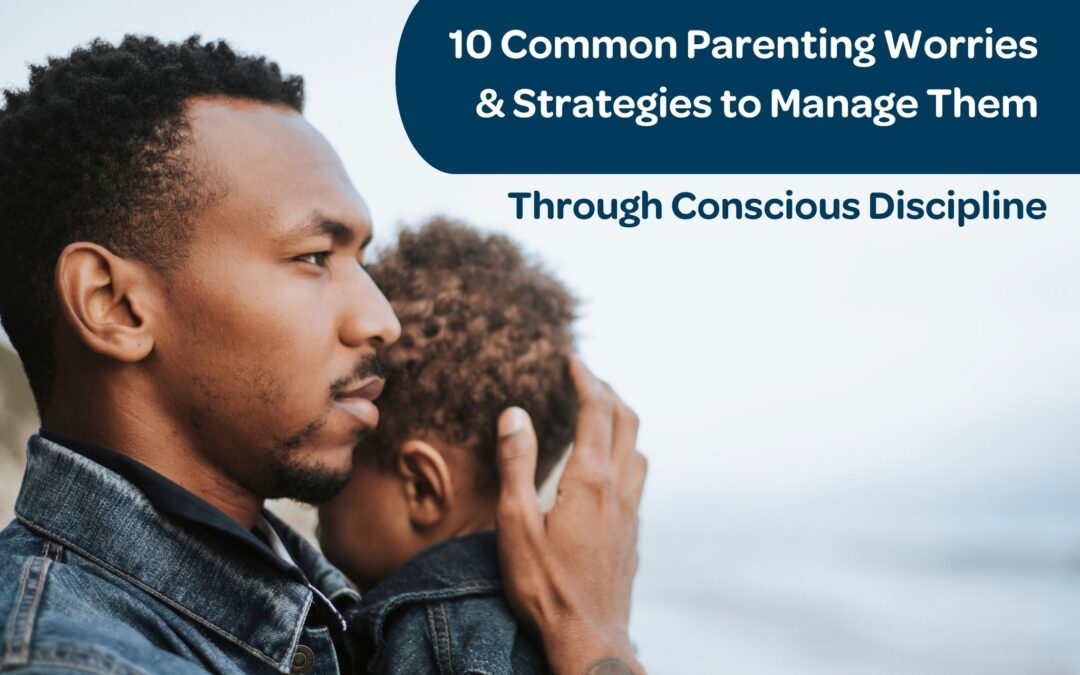Celebrating National Parents Day: July 25th, 2023
Parenting is a transformative journey filled with love, growth, and occasional worries. As we celebrate National Parents Day on July 25th, let’s explore common concerns through the lens of Conscious Discipline—an approach that promotes connection, empathy, and self-regulation. By applying these principles, we can navigate the challenges of parenthood with compassion and intention, fostering healthy relationships and nurturing our children’s social-emotional development.
1. Health and Safety:
Conscious Discipline emphasizes the importance of safety and self-regulation. Teach your child self-awareness and self-care practices, such as deep breathing and using calming strategies. Create a safe environment, both physically and emotionally, where your child feels secure and supported.
2. Discipline and Behavior:
Dealing with behavioral issues can be a significant source of stress for parents. Instead of traditional discipline methods, Conscious Discipline encourages connection and teaching over punishment. Build a strong relationship through daily special time and intentional rituals, so, when discipline is needed, they know that you are on their side. Use logical consequences that help children learn from their choices and develop problem-solving skills.
3. Academic Performance:
Conscious Discipline recognizes that learning occurs within the context of relationships. Engage in reflective listening to understand your child’s unique strengths and challenges. Create a loving and stimulating environment where your child can explore, discover, and develop a love for learning.
4. Peer Pressure and Socialization:
Support your child in navigating social interactions by modeling empathy and teaching problem-solving skills. Foster a sense of belonging within the family and community. Encourage open communication, active listening, and empathy to help your child make confident choices when facing peer pressure.
5. Technology and Screen Time:
Conscious Discipline emphasizes the need for balance and mindful use of technology. Create technology agreements together with your child, setting limits and discussing responsible digital citizenship. Engage in shared screen time activities that promote connection and learning.
6. Balancing Work and Family:
Conscious Discipline encourages parents to prioritize connection and self-care. Create a daily routine that includes special, designated time with your child. Even if you have limited time to spend with your child, focus on the quality of that time spent together by being fully present truly connecting. Practice self-regulation strategies to manage your stress and set clear boundaries between work and family time. Seek support from your community and those around you to ensure a balanced and harmonious lifestyle.
7. Emotional Well-being:
Nurture your child’s emotional well-being by fostering a safe space for expression and understanding. Teach emotional intelligence skills, such as identifying and labeling emotions. Use calming techniques such as deep breathing and validate your child’s feelings, helping them develop self-regulation and resilience.
8. Sibling Rivalry:
Conscious Discipline teaches conflict resolution skills and promotes cooperation among siblings. Encourage siblings to express their feelings using “I” statements and provide them with tools for problem-solving and negotiation. Facilitate shared experiences and collaborative activities to strengthen their bond.
9. Future Success and Achievement:
Parents often worry about their child’s future success and happiness. Remember that success comes in many forms and varies for each individual. Encourage your child’s passions, interests, and strengths, and shift the focus from external measures of success to internal growth and personal empowerment. Conscious Discipline promotes intrinsic motivation by fostering a growth mindset. Emphasize the value of effort, resilience, and self-improvement, by encouraging your child to set goals, celebrate their progress, and practice creative problem-solving in the face of challenges.
10. Self-Doubt and Parenting Guilt:
It’s normal to experience self-doubt and guilt about difficult parenting decisions. Remember that there is no such thing as a perfect parent, and understand that every parent makes mistakes and learns along the way. Be kind to yourself, seek support from other parents, reflect, and focus on the love and care you provide for your child.
As we celebrate National Parents Day, let’s approach our parenting worries with the principles of Conscious Discipline. By fostering connection, encouraging empathy, and teaching self-regulation, we can navigate the challenges of parenting while nurturing our children’s social-emotional well-being. Embrace your parenting journey with intention, love, and an unwavering commitment to raising emotionally healthy and resilient children.

